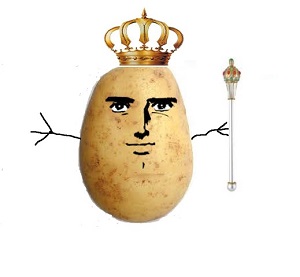By Andy Jackson
Friedrich Hohenzollern (1712-1786) was the king of Prussia known to history as Frederick the Great. He earned this title due to his military talents. King Frederick transformed Prussia into a major military power, greatly expanded the area of his kingdom, and set the stage for the formation of modern day Germany. In addition to his military ability, Frederick was a talented musician, a patron of the arts, and an avid gardener. At the time of his reign, the Prussian diet was largely dependent on grain, primarily wheat and rye. When one of those crops failed, widespread hunger resulted. King Frederick wanted to diversify the Prussian diet to make it less dependent on grain.
Frederick became interested in a vegetable recently introduced to Europe from South America, the potato. The more he studied this exotic new tuber, the more he became convinced that not only would it grow well in Prussia, but it could make a significant contribution to the diet of the Prussians. He had a large amount of seed potatoes imported and ordered the Prussian farmers to plant this new vegetable. The stubborn Prussian peasants were skeptical of this unknown plant and were reluctant to devote part of their fields to growing it. Many refused to plant the seed potatoes, and many of the peasants who did plant them did not know what to do with the strange tubers, and boiled it into a tasteless mush.
King Frederick’s advisors informed him that his experiment was failing, and advised that he impose a heavy fine on all those peasants who refused to plant potatoes. Frederick had a better idea. He issued a decree that proclaimed the potato to be a Royal Vegetable, and that henceforth, only the Royal Family and his most favored nobles would be allowed to grow and eat potatoes. Further, he announced that his soldiers would guard the Royal Vegetable Gardens night and day to prevent any ‘common’ people from obtaining this special food. Needless to say, this decree greatly increased interest in potatoes, and the Prussian burgers and peasants alike wanted to try this new, forbidden fruit. Those peasants who still had the seed potatoes sold them at a high price or planted them in the most fertile part of their fields.
In a break with rigid Prussian discipline, Frederick quietly ordered his commanders to allow the troops guarding the Royal Gardens to take frequent breaks at the nearest village Bauhaus. Normally law abiding Prussian burghers slipped into the gardens and took potato plants and transplanted them in their own gardens.
Frederick did not want the potato to be a short-lived fad, so he ordered his royal chefs to create recipes using potatoes that would appeal to the Prussian palate and had the recipes printed in newspapers throughout the kingdom. Within a remarkable short time, the potato became a staple crop and a mainstay of the Prussian diet. To this very day, many Germans fondly refer to Frederick the Great a “Der Kartoffelkonig”, the Potato King.
Andy Jackson, a Master Gardener, class of 2014, lives in Montgomery. For more information on becoming a master gardener, visit www.capcitymga.org or email capcitymga@gmail.com.
 Part of the Alabama Cooperative Extension Service (ACES)
Part of the Alabama Cooperative Extension Service (ACES)
